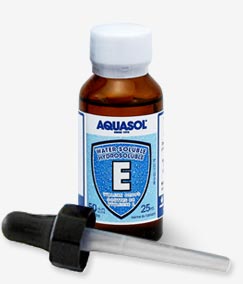Aquasol® E Drops
Vitamin E Drops in a water soluble drop formulation.
 Aquasol® E Drops is a liquid nutritional supplement for the treatment of vitamin E deficiency.
Aquasol® E Drops is a liquid nutritional supplement for the treatment of vitamin E deficiency.
The unique feature of Aquasol® E is that it is a WATER SOLUBLE vitamin E, rather than a fat soluble Vitamin E, allowing it to be used specifically in cases where patients have malabsorption problems. Further, it is one of the only drop formulations available, making it ideal for infants and babies who are unable to swallow tablets or capsules.
Aquasol® E Drops come in a 25ml bottle containing 50 I.U of Vitamin E per ml (as 50 mg dl-alpha tocopheryl acetate).
Is it recommended for young children?
Given its water soluble form and liquid formula, Aquasol® E is primarily used for treating newborns and infants who absorb fat poorly.
Where can I purchase Aquasol® E Drops?
Aquasol® E Drops are classified as OTC (over the counter) but are not often found on the shelf. Rather, most pharmacists will order the product on request for customers seeking a water soluble drop formulation of Vitamin E.

Aquasol® E Drops may be administered directly on the tongue, or mixed in milk, formulas, fruit juices, cereals, soups, desserts, or any other liquid or semi-liquid food.
Dosage: Orally, 1 ml daily, or as directed by a physician.
Ingredients: 50 I.U. Vitamin E/ ml, (as 50mg dl-alpha tocopheryl acetate), flavours, polysorbate, propylene glycol, sorbitol, water.
Aquasol® E Drops is a Natural Health Product approved by Health Canada as safe, effective and of high quality.
NPN: 02162075
While most humans consume enough Vitamin E daily from a variety of foods such as vegetable oils (corn, cottonseed, soybean, and safflower), wheat germ, whole-grain cereals, and green leafy vegetables, some people have medical conditions which prevent them from absorbing Vitamin E in to the body, where it is stored in body fat. Given that Vitamin E is fat soluble vitamin, patients who suffer from intestine disease, liver disease, pancreas disease or the surgical removal of the stomach, can not absorb Vitamin E and therefore suffer from Vitamin E deficiency which can impede the proper functioning of nerves and muscles. Other conditions such as cystic fibrosis, chronic cholestatic liver disease, abetalipoproteinemia and short-bowel syndrome may also cause varying degrees of neurologic deficits due to related vitamin deficiencies.


